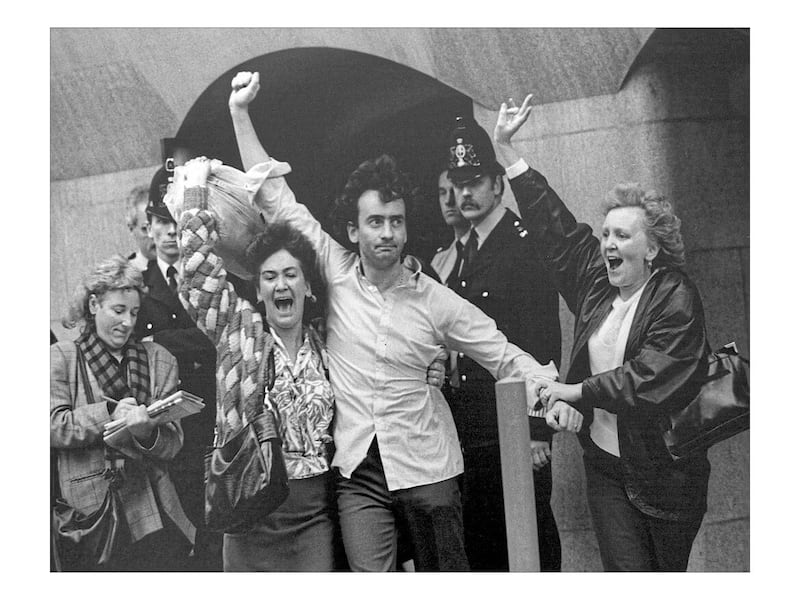John Hume was often accused of having a ‘single transferable speech’ which he deployed every time he was near a microphone. Like all generalisations, there may have been a grain of truth in the allegation. But what a speech.
The constant repetition of its core message – that uniting Ireland was not about territory but about bringing people together – brought about the peace process and unquestionably saved many lives.
Along the way, Hume had abuse heaped on him, and not just by his political opponents. But he stuck to his course, dragging the British and Irish governments, republican and loyalist paramilitaries and a majority of unionists along with him.

There’s something of John Hume about Post Office campaigner Alan Bates, one of the few people to emerge with dignity from the scandal which was laid bare in a television drama earlier this month.
Bates’s determination to secure justice for hundreds of sub-postmasters accused of stealing from their own businesses is eventually paying off after years of campaigning. He is truly a modern-day hero.
I don’t need to go into the intricacies of the scandal. Suffice to say that 236 innocent men and women were jailed for theft in prosecutions brought by the Post Office when, in reality, the money had been taken by the Post Office itself.
- British ‘justice’ destroyed my father’s business and reputation - Jake O'KaneOpens in new window
- ‘They asked if we were giving money to paramilitaries’ - former Tyrone subpostmistress recalls horror of Horizon investigationOpens in new window
- The Post Office scandal: What is it and has anyone been held accountable?Opens in new window
Many more had their lives destroyed – losing their homes, their businesses and, in some cases, their lives – because the Post Office refused to accept clear evidence that the accounting system it had implemented was deeply flawed.
The scale of the miscarriage of justice has shocked people in Great Britain, but readers of The Irish News will not have been surprised.
Time and time again, ordinary men and women have been the victims of injustices inflicted by a state which will do anything to protect itself and its institutions.
There have been attempts to scapegoat individual ministers – Liberal Democrat leader Sir Ed ‘don’t say sorry’ Davey among them. But the truth of the matter is that the first prosecutions began under the last Labour government, and continued under the Tory-Lib Dem coalition, and successor Tory administrations.

The High Court victory which brought public attention to the Post Office’s malign prosecutions of innocent people happened four years ago. Its disgraced chief executive Paula Vennells (gobsmackingly a part-time priest) was honoured with a CBE as recently as 2019.
Now, after years of inaction, Rishi Sunak’s administration has responded to the public outcry. It’s nothing to do with the ITV drama, of course.
Those convicted will have their sentences quashed by an Act of Parliament. It’s the right thing to do.
The Post Office scandal exhibits many of the same traits seen in cases such as the Birmingham Six and the Guildford Four: a hubristic state which believes it can do no wrong; the identification and prosecution of scapegoats who have been vilified and demonised; and a compliant judiciary which assumes people are guilty until proven innocent
But how ironic, given the same prime minister has legislated in the same parliament to perpetuate injustice here through his so-called Northern Ireland Troubles (Legacy and Reconciliation) Act – a pernicious attempt to protect state forces from prosecution.
The deployment of injustice as a means of holding on to power is endemic in British governance.
The Post Office scandal exhibits many of the same traits seen in cases such as the Birmingham Six and the Guildford Four: a hubristic state which believes it can do no wrong; the identification and prosecution of scapegoats who have been vilified and demonised; and a compliant judiciary which assumes people are guilty until proven innocent.

The police are now investigating the scandal and a public inquiry is underway. But, regardless of what compensation is paid, there will never really be justice for the victims; even if those responsible for their plight face justice themselves.
Lives destroyed cannot be put back together again.
As ever, there will be cries of ‘lessons must be learned’; ‘this must never happen again’. But we know that the only lessons learned will be ‘we must cover our tracks better next time’.
As for miscarriages of justice, we all know the next scandal is only round the corner.




